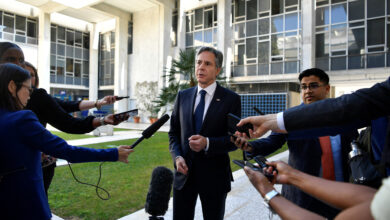It is not clear why commentators in independent and partisan newspapers insist on pointing out the negative features of the 2010 People’s Assembly elections rather than looking at the glass half-full, writes Ahmed Soqarno in state-run Rose al-Youssef. Soqarno points to two particularly positive features of the 2010 elections, namely the fact that Egypt is one of the few countries in the Arab World with a relatively independent judiciary and where civil society organizations are allowed to observe elections and report freely on electoral violations. The elections demonstrated that Egypt’s judiciary has a great deal of independence, which should give Egyptians hope for a better future, according to Soqarno.
While some commentators like Soqarno tout these positive aspects, others, such as Mostafa Kamel al-Sayyed characterize the actions of the National Democratic Party (NDP) secretary of the organization in staging these elections as “playing with fire,” regarding the country’s future. Writing for privately-owned Al-Shorouk, al-Sayyed argues that the 2010 elections have grave consequences for Egypt’s future, including the disintegration of the rule of law, depreciated opportunities to build strong political parties, and diminished hope for integrating the Muslim Brotherhood into a legitimate political framework.
The 2010 elections witnessed the greatest disregard for the rule of law in Egypt’s recent history, according to al-Sayyed. This disregard essentially means closing off the only door for political reform in Egypt, especially since the NDP leadership is unlikely to initiate political reforms independently. With regard to opposition parties, NDP leaders continue to argue that the elections demonstrated lost credibility for non-NDP parties. While al-Sayyed acknowledges that all opposition political parties are weak in Egypt, he points out that the ruling party is somewhat responsible for this, given the restrictions it places on its competitors. The results of the recent People’s Assembly elections, thus, make it difficult for people to regain their faith in political parties, and severely diminish chances for promotion of Egyptian political pluralism.
The 2010 elections also reflect a mistaken attempt by “geniuses” in the NDP’s organization secretariat and politburo to completely exclude the Muslim Brotherhood from Egyptian politics. Such an attempt ignores lessons learned from Algeria or Pakistan, namely the fact that the best policy with regard to dealing with an Islamist political movement is to allow it to operate as a recognized party that has rights and obligations. Ignoring this lesson, al-Sayeid argues, is a clear message to the youth who believe the ideology of the Muslim Brotherhood, that they have no place in peaceful politics. As a result, they are left with the option of using violence against the state and society.
Finally, the conduct of the 2010 elections, and the NDP’s resolve to secure 97 percent of parliamentary seats have eliminated any hope that Egyptians might have of gradual, and peaceful change. Although many Egyptians did not vote in the most recent elections, they are not opposed to the principle of participation. Rather, they are willing to participate when such participation is serious and effective, not when it is marred by irregularities and a lack of transparency.
In light of these circumstances, al-Sayyed wonders if there are any opportunities left for political reform. It is not clear, he argues, whether political reform will now be achieved through clandestine activities, terrorism, revolution, or the intervention of armed forces.
Egypt's papers:
Al-Ahram: Daily, state-run, largest distribution in Egypt
Al-Akhbar: Daily, state-run, second to Al-Ahram in institutional size
Al-Gomhorriya: Daily, state-run
Rose al-Youssef: Daily, state-run, close to the National Democratic Party's Policies Secretariat
Al-Dostour: Daily, privately owned
Al-Shorouk: Daily, privately owned
Al-Wafd: Daily, published by the liberal Wafd Party
Al-Arabi: Weekly, published by the Arab Nasserist party
Youm7: Weekly, privately owned
Sawt al-Umma: Weekly, privately owned




